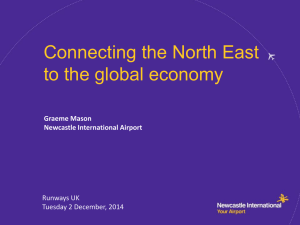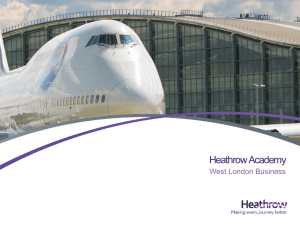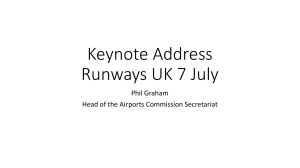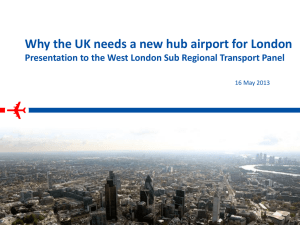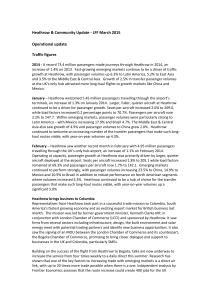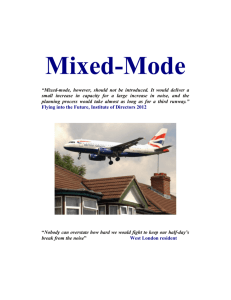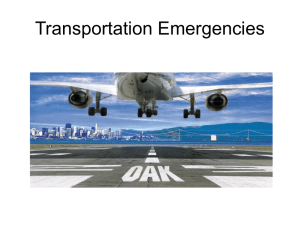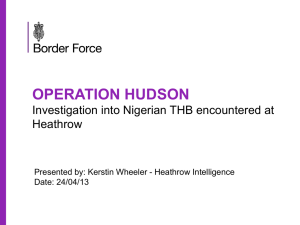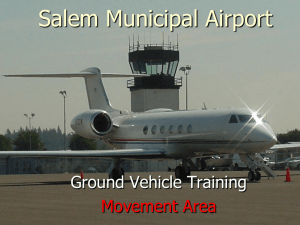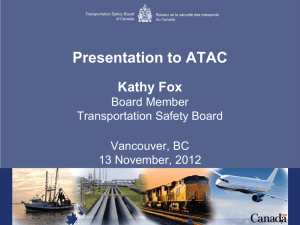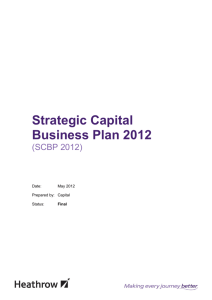Professor Colin Bamford, University of Huddersfield
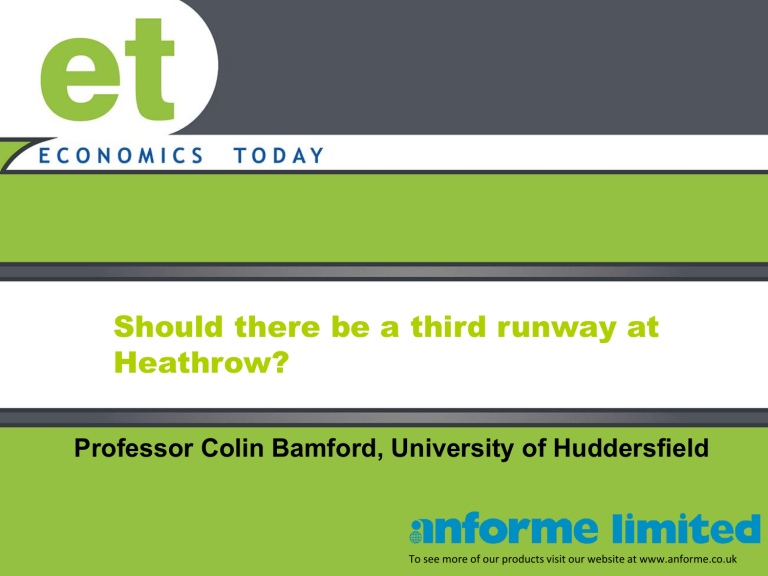
Should there be a third runway at
Heathrow?
Professor Colin Bamford, University of Huddersfield
To see more of our products visit our website at www.anforme.co.uk
Introduction
•
C
Airports, especially in the South East and Heathrow in particular, are vital for the country’s business well-being and competitiveness in the global economy.
•
C
Airports and air travel generate a wide range of negative externalities, the most important being noise disturbance.
•
C
There are also serious concerns about emissions from aircraft with around 6% of all CO2 emissions coming from aircraft.
•
C
But as the CBI has recently said: “The UK risks becoming a branchline destination and will find it increasingly hard to compete in global export markets if it does not ... tackle constraints on capacity at
Heathrow.”
•
C
There are also positive externalities through additional employment created around Heathrow and throughout the economy as a whole.
The lack of a clear policy
•
C
Air transport policy in the UK has been haphazard and lacking a clear strategic objective as far as London’s principal airport is concerned.
•
C
Many would argue that this is due to the widely held view that
Heathrow is in the wrong place.
•
C
Far too many people are affected by the noise of aircraft taking off and landing and from road traffic in the vicinity of Heathrow.
•
C
The Coalition government reversed its predecessor’s decision to approve a limited expansion through a third runway and sixth terminal.
•
C
A new aviation review is about to take place, and this has reopened the political debate about building a third runway at Heathrow.
The demand for air travel
•
C
The demand for air travel is a derived demand.
•
C
It is not demanded for its own sake but because it allows users to fulfil a purpose such as travelling for business or holidays.
•
C
For air passenger services the annual rate of change has been remarkably steady until the 2008 recession began to affect passenger numbers.
•
C
In 2011 UK airports handled 219m terminal passengers, 134m at London airports, which was an increase of 5% on 2010.
•
C
Over 69m passengers passed through Heathrow, an all time high, and a growth of 6% on 2010.
•
C
Heathrow is operating at 99.2% of capacity with Gatwick not far behind.
Why we need more airport capacity 1
•
C
If forecasts of demand are to be believed, by 2030 between 410m and
500m passengers will be using our airports.
•
C
In the March 2012 Budget it was announced that the
Government would conduct a review of aviation policy.
•
C
According to the CBI this will be the eleventh such policy review over the past 60 years.
•
C
The CBI argues that quick decisions need to be made on a new runway to serve the South East, and how to maximise capacity and improve access to other regional airports.
Why we need more airport capacity 2
•
C
The case for a third runway at Heathrow is being vigorously promoted by leading industry figures.
•
C
In their view Heathrow has to be the hub solution for the short to medium term at least.
•
C
Recent research by the British Chambers of Commerce has shown that business leaders in the emerging high growth economies such as China,
India, Brazil and Russia put a high value on direct air links.
•
C
Of those interviewed, 80% claimed that they would trade more with the
UK if flight connections were improved to their countries.
•
C
At present only three cities in China have direct links with Heathrow.
•
C
The key business issue is that the UK is already losing out in terms of its competitiveness in the global economy.
Environmental considerations 1
•
C
For many years the noise from aircraft arriving and taking off at Heathrow has been measured.
•
C
The problem with aircraft noise is that above a certain level, it becomes an unwanted disturbance on our ears.
•
C
But over the years, aircraft have become quieter, and despite an increase in traffic, less people in the vicinity of Heathrow have been adversely affected by aircraft noise.
•
C
The main cause of the improvement has been technical, with newer aircraft making less noise.
Environmental considerations 2
•
C
A third runway at Heathrow would cause the village of Sipson to disappear and much of Harmondsworth to be demolished.
•
C
In addition, it has been estimated that an additional one million people living under flight paths will suffer from noise disturbance.
•
C
A second environmental issue is that of CO2 emissions.
•
C
If the third runway operates at full capacity then an estimated 27m tonnes of CO2 will be generated from Heathrow’s operations, a 50% increase on current levels.
Environmental considerations 3
•
C
The UK has a legal commitment to reduce its greenhouse gas emissions by 80% below 1990 levels by 2050.
•
C
It has been estimated that by 2050, with a third runway fully operational,
Heathrow will generate between 20 and 25% of the UK’s entire emissions budget.
•
C
A further cause for environmental concerns is the emission of nitrogen dioxide from aircraft movements.
•
C
Further negative externalities come about because of the road congestion in the vicinity of Heathrow.
•
C
Rail travel though has improved considerably with the Heathrow Express services from Paddington.
Does cost-benefit analysis help?
•
C
Cost benefit analysis is a well tried method for assessing the desirability of a project like that of a third runway.
•
C
It tries to estimate the respective benefits and costs over time and over a wide area.
•
C
In 2009 a Department for Transport report stated that adding a third runway would generate net benefits of around
£
5bn.
•
C
But in 2010 the New Economics Foundation concluded that there would be a net cost to society of between
£
5b and
£
7.5bn, based on a Social
Return on Investment approach.
•
C
However, critics of this would say that the economic and business benefits are not given the same degree of prominence as measures designed to reduce environmental impact.
Conclusions
•
C
Like many controversial topics in Economics there is no particular agreement amongst those concerned as to whether a new third runway should be built at Heathrow.
•
C
We will have to await a decision until the consultation on airport strategy has been completed.
•
C
Other possibilities include a completely new airport on the Thames
Estuary popularly known as ‘Boris Island’ as it is supported by the
London Mayor, Boris Johnson.
•
C
There could also be a major expansion of Birmingham Airport, or the construction of a high speed rail link between Heathrow and Gatwick to create a better hub.
•
C
Unless decisions are made soon, the UK really will be a branch-line destination for global air transport.
